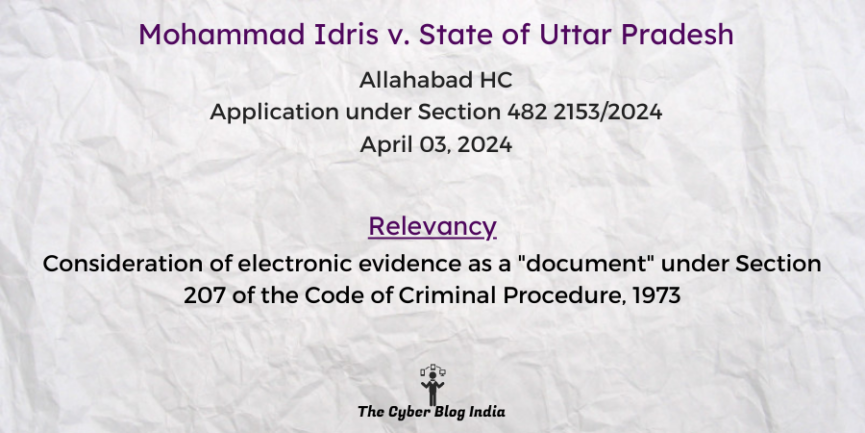Mohammad Idris v. State of Uttar Pradesh

Mohammad Idris v. State of Uttar Pradesh
In the High Court of Allahabad
Application under Section 482 2153/2024
Before Justice Shamim Ahmed
Decided on April 03, 2024
Relevancy of the case: Consideration of electronic evidence as a “document” under Section 207 of the Code of Criminal Procedure, 1973
Statutes and Provisions Involved
- The Information Technology Act, 2000 (Section 3, 2(1)(t))
- The Indian Penal Code, 1860 (Section 120B, 499)
- The Code of Criminal Procedure, 1972 (Section 482, 207)
- The U.P. Prohibition of Unlawful Conversion of Religion Act, 2021 (Section 3, 4, 5, 8)
- The Indian Evidence Act, 1872 (Section 3)
Relevant Facts of the Case
- The prosecution did not supply the applicant with a copy of the electronic evidence at the beginning of his trial, as required under Section 207 of the Code of Criminal Procedure, 1973.
- The High Court granted bail to the applicant on December 07, 2023. However, the trial court framed the charges against the applicant and proceeded with the trial without supplying a copy of the electronic evidence.
- The trial court also appointed an amicus curie against the applicant’s wishes. The trial court passed an order regarding the applicant’s wishes on March 03, 2024. However, it did not comment on the need to comply with Section 207.
Prominent Arguments by the Advocates
- The applicant’s counsel argued that the electronic evidence is a document. It falls under the purview of Section 3 of the Indian Evidence Act, 1872. Hence, the prosecution must supply a copy of the document under Section 207 of the Code of Criminal Procedure, 1973.
- Further, the counsel relied on Tarun Tyagi v. CBI, 2017 4 SCC 490, where compliance with Section 207 was considered essential to a fair trial.
Opinion of the Bench
- The court declared that the trial court did not appreciate the substance of the order passed by them. The trial court continued the trial without complying with Section 207, which showed misconduct.
- The court also expressed the importance of a judge’s integrity and the requirement that his conduct be always virtuous.
Final Decision
- The court stayed the operation of the trial court’s orders and placed a stay on the applicant’s trial.
- The court directed the concerned trial court judge to file an affidavit explaining his decision not to follow this court’s previous order and summoned him for the next hearing.
